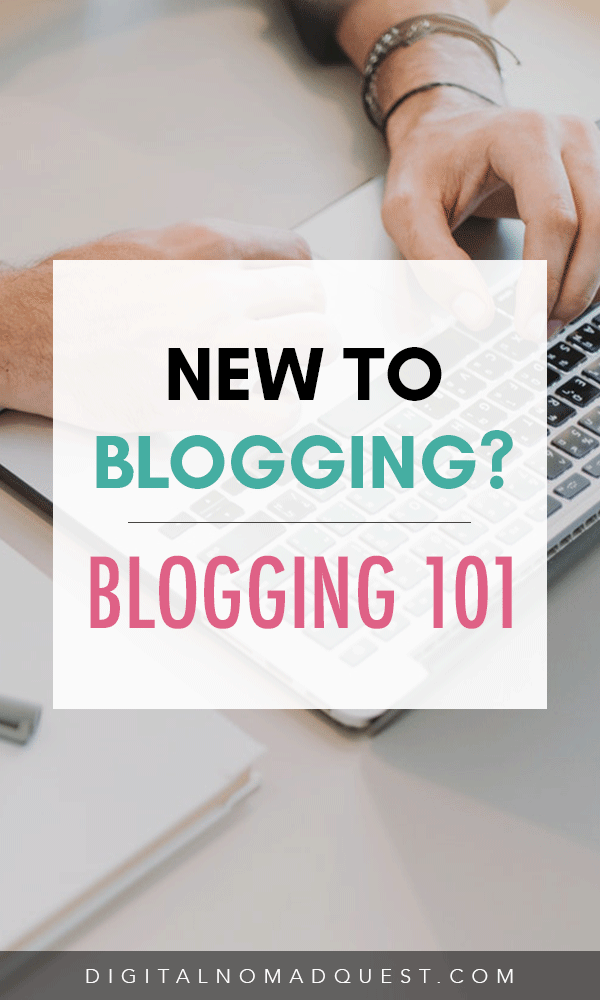Today we have one of my writers, Garry Goertzen, talking about what is blogging, the history behind it, where to start one, and blogging terminology you should learn. I think this is a great introduction that will hopefully get you started on your first blog!
What Is Blogging? Blogging 101
A Quick History of Blogs
Blogs began as a result of the increasing use of technology and the creation of the Internet. At first, both blogs and the internet were used primarily by government agencies, military personnel, and academics and scientists. Blogs were not known as blogs, but as networks instead.
Before the expansion of the World Wide Web, communities of like minded people interacted using these networks as a platform. Individuals would create content that could be kept personal or accessed by other members of their network and store the content on computers that had connections to the networks.
Prior to the boom in blog popularity, these communities generally shared content and communicated using dedicated message boards. Eventually, the term “newsgroups” was coined. This term was used to describe many of the various communication areas and forums.
The earliest true blogs as we know them popped up around 1994 known as “open access diaries”. Here, individuals could share updates about their lives, personal thoughts, and events such as academic studies, travels, career changes, and of course, their families.
A few of the earliest online diary writers include Claudio Pinhanez, Carolyn Burke, and Justin Hall. The media began taking note of blog content and documenting its formation somewhere between 1996-1997; however, the exact date that the term “blog” was first used is still unknown. It’s a common belief that 1999 was the birth year of the term, as it was said to be a shortened form of the word “web-log” that was sometimes used to describe these communications.
Why do people blog?
There are a number of reasons why people may choose to start or contribute to a blog. Many blog writers simply prefer documenting their diaries electronically instead of using the traditional pen and paper method. Others enjoy the anonymity that sharing their personal thoughts and feelings brings with people they cannot see. Or, sometimes blogs are used for the management of chronic pain or extreme grief, as the outlet allows its writer to write freely and without reservation.

Delving into the more technical, business-minded reasons behind blogging, blogs are a great way to boost SEO rankings. This works because blogs are frequently updated and kept in a higher position, whereas standard websites are not generally kept as up to date, which ultimately puts their rankings lower. Search engines rank new content higher than old, meaning that blogs that frequently update are more likely to be found by viewers conducting searches.
How is Money Made by Blogging?
In addition to boosting their website’s traffic by way of frequent updates, many bloggers make money by using their blog as a way to connect with and build trusting relationships with readers who are interested in what they have to offer (products, services etc). Although this point is aimed at business blogs more than recreational blogs, it’s important to note that anyone can make money using their blog.
Businesses who opt to utilize their blog will offer their readers content that they might find useful, interesting, and entertaining, or that showcases their expertise. Consumers are more likely to purchase products from bloggers that they trust as knowledgeable. They’re also more likely to become a repeat customer if they are offered free content. Once a consumer begins to rely on the content of a specific blog, they will often be quicker to purchase recommended products that said blog mentions. Chances are also higher of them recommending the blog and/or products on the blog to their friends on social media, which can lead to future sales and new customers, as well as loyal readers.
Some blog owners earn money when a reader clicks on a static or dynamic ad or various other embedded links found on their blog and the action leads to a sale. These ads and links lead to affiliate partner websites where, once a purchase is made, the referring blog owner earns a commission for aiding in the making of a successful sale.
Some blog owners also earn money for simply directing traffic to partner websites. If this is the case, a small reward is given each time someone clicks an outward bound link or ad on the blog that leads to a specific site.
Finally, many people who own blogs make money by selling their blogs and blog posts. A successful blog sale usually happens after a niche blog website starts to gain high traffic, making it appealing to an investor who sees it as a tool to make money.
What’s the Difference Between a Blog and a Website?
The biggest difference between a blog and a website is that a blog is a specific type of content that is displayed on a webpage. A website is, essentially, a host for various types of content (including blogs).
Most of the time, confusion occurs when individuals use the terms “blog” and “website” interchangeably. For example, a client might say that they visited a company’s blog, implying that their blog is its own entity. In reality they mean that they visited a website that contains a blog, but the blog is not the primary part of the site. Sometimes websites start blogs just to drive traffic in order to get conversions on their product.

To make the explanation easier, keep in mind that in most cases, non-blogging websites see new content less frequently than a blog or blog-devoted website. A blog will generally receive weekly -if not semi-weekly or daily- updates. Non-blog specific websites, such as a personal interest sites showcasing photography, will only add new posts once a week or less frequently, adding updated information to the already existing posts and pages as necessary in between their scheduled new updates.
Blogs are also great at promoting and encouraging discussions. They have comment sections that allow readers to share their opinions and reply to comments of other readers, effectively starting conversations and encouraging readers to interact with each other and the given material.
Is a blog or a website better?
As a blogging newbie, you might be wondering if you should start a blog or a website. After all, you want to start one of whatever is best, right? Unfortunately, the answer to this question isn’t black and white. It depends what your goals are in relation to your website or blog.
More often than not, small businesses make use of traditional websites that contain just a collection of web pages and no dedicated blog. These sites are made as an informational tool, designed to inform viewers about various aspects of the business, service, or individual.
As time goes on, more and more businesses are realizing the potential that blogs offer as content marketing via blog can really get you hits on your site. However, going back to the original question, if you’re looking for a way to display information, having only a website would suit you just fine. For a more interactive, creative outlet, however, a blog or a blog in addition to your site, would be a good idea.
What are a Few of the Most Beginner Friendly Blogging Platforms?
WordPress
WordPress comes in two variations: WordPress.com and WordPress.org. There are a few differences between the two, the most well-known being that WordPress.org is completely free. This variation requires only a domain name and preexisting web hosting to use.
WordPress.com is hosted by the creator of WordPress.org, and while there is a free plan for this particular platform, it is quite limiting. In addition to the free plan, however, there are four additional plans with varying price ranges.
WordPress.org
Pros:
- Users are given complete control over their site
- There are a number of available plugins for customizing and updating hosted sites
- There are a plethora of available themes
Cons:
- Having complete control can be overwhelming if you are not familiar with web design
- It takes time to learn how to manage the site.
WordPress.com
Pros:
- Simple to manage and easy to use
Cons:
- You can’t run ads on the site, eliminating PPC and partnership revenue
- Limited to WordPress’ own themes
Squarespace
Squarespace is very beginner friendly. It uses a unique system that allows users to click and drag photos to different locations and makes customization easy. It also offers 24/7 support for users. However, there is a cost to using this platform.
Despite this, their plans are relatively affordable. When you use the platform, you gain access to because you have access to analytics and data about your blog, both of which can aid in a growing follower count.
Pros:
- Preexisting blogs from Tumblr, Blogger, and other platforms can be easily imported
- 24/7 user support
- User friendly and simple
- A wide variety of customizable themes
- Templates are mobile friendly
Cons:
- Personal plan limits users to 20 pages
- Only enable users to use built-in features
Blogger
Blogger is owned by Google. It’s fairly user friendly and relatively simple to get the hang of.
Pros:
- Setup is easy
- Simple design and management
- No fee to use
Cons:
- Limited creative tools without the ability to download or install added tools
- Design options are few and far between

The best recommendation?
If you want to rank high with your blog, do well with SEO, and have more customizability options, you should choose WordPress:
1. Get Hostgator for your hosting plan
2. Connect it with a domain you get on Namecheap
3. Connect WordPress through your cPanel on Hostgator.
It seems complicated but it isn’t. I got my friend started within 10 minutes using my instructions on this post. You want to make sure you start with the best option so you don’t go back and regret it later!
Blog Terminology
- Archives – An archived post or the section of a blog known as “archives” is essentially a collection of posts that have been put aside, reminiscent of the way books are stored at a library -available but not out in the open at all times. Posts that have been archived are available for viewing but not showcased on the front page of a blog. They are generally located in their own space on a website, categorized by date.
- Comments – Most blogs have sections where readers can leave a comment. These comments give the blog an interactive element and allow readers, authors, and interested parties to communicate and connect. When a reader goes to add a comment, the section will ask for their email address, name, and website if they have one.
- HTML – HTML, also known as Hypertext Markup Language, is the standard language in which modern websites are built. Predeccessing XHTML, the term HTML is often still used when referring to either language. HTML is commonly used in combination with JavaScript and CSS to create stunning, visually appealing web pages.
- Category – On most blogging platforms, blog posts are filed under different categories. These categories allow posts to be grouped together based on common themes and keywords that relate them together. Categorizes are also organizational tools.
- Feed – This term refers to the newsfeed of a blog. Similar to the newsfeed that is found on Facebook, the “feed” features a range of content from older content to new, updated content.
- Platform – Platform refers to the software used to host a blog. The platform is the website in which a blog is hosted on.
- Theme -This refers to the visual appearance of a blog. Essentially, it is the theme or design of a blog. Many of the major blog platforms offer free themes that bloggers can choose from when starting or changing their blog. Many themes also allow users to customize them, changing things such as layout and colors.
- Niche – A niche refers to the small portion of the population that a blog’s content caters to. Niches include travel, food, and fashion.
- Avatar – Avatars are graphics or logos that represent a user.
- Draft – A draft is an unpublished blog post. Drafts can be saved for later editing or additions, and published when the author sees fit. They can only be edited through the admin panel.
- Admin Panel – An admin panel is a panel, usually consisting of editing and security tools, that only the owner of a blog or specified users can access.
Conclusion
Hope you guys enjoyed this post on what is blogging! It covered extensive amounts of information on blogging. As you follow this blog, I’ll include more information on how to optimize your blog for SEO and how to monetize it. Let me know if you have feedback in the comments below!


